 Shadows off the beaten path
Shadows off the beaten pathHOW I ENDED THIS SUMMER | MAMMOTH | THE SLEEPING BEAUTY
< < F O R E I G N > >
last update 28.Oct.10
See also: SHADOWS FILM FESTIVAL
 R E V I E W B Y R I C H C L I N E
R E V I E W B Y R I C H C L I N E Luftslottet som Sprängdes
Luftslottet som Sprängdes
prd Søren Stærmose
scr Jonas Frykberg, Ulf Ryberg
with Michael Nyqvist, Noomi Rapace, Lena Endre, Annika Hallin, Jacob Ericksson, Sofia Ledarp, Anders Ahlbom Rosendahl, Mikael Spreitz, Mirja Turestedt, Niklas Falk, Hans Alfredson, Georgi Staykov

release Swe 27.Nov.09,
US 29.Oct.10, UK 25.Nov.10
09/Swe 2h28
 Noomi Rapace
Noomi Rapace
SPECIAL
INTERVIEW
>>>
• THE GIRL WHO PLAYED WITH FIRE (2009)
• THE GIRL WITH THE DRAGON TATTOO (2011)
 For the final chapter in Stieg Larsson's Millennium trilogy, the plot is really the thing. And while the events are fascinating and entertaining, the film itself is less emotionally involving or viscerally thrilling.
For the final chapter in Stieg Larsson's Millennium trilogy, the plot is really the thing. And while the events are fascinating and entertaining, the film itself is less emotionally involving or viscerally thrilling.
As Lisbeth (Rapace) recovers from her injuries, Michael (Blomkvist) and the Millennium magazine team (Endre, Ericksson and Ledarp) are finalising the special edition about her, which they hope to publish before her trial starts. But a secret network of spies is doing everything they can to stop them, and Lisbeth's murderous half-brother Ronald (Spreitz) is still on the loose. Fortunately, Michael is also working with government agents (Turestedt and Alfredson) to blow the lid on this secret society before Lisbeth's vile psychiatrist (Rosendahl) can lock her up again.
The original title refers to an air-castle that bursts, which is perhaps just as apt a metaphor as kicking a hornet's nest. This is a movie about government conspiracies, sinister plots and carefully guarded state secrets, all of which are about to be exposed. And perhaps the main problem with this film is that we are never in doubt that everything is going to come out in the end. The result is that, while there are moments of suspense, there isn't any real tension in the plot.
But after the previous two films we have a lot invested in these characters, and the ongoing connection between Lisbeth and Michael is still thoroughly involving, even if it feels a bit colder now. It helps that Michael's sister (Hallin) takes a more prominent role here as Lisbeth's lawyer, and she gets most of the film's best scenes. And there's also, of course, a satisfyingly epic conclusion to the saga, which resolves in a series of scenes that are surprising and cathartic.
Taken as a single story, this is a sprawling mystery thriller that basically looks at how the law and culture systematically discriminate against women while men ignore any responsibility for justice. It's pretty powerful stuff, packed with telling detail and vivid characters, so it's understandable that the books and films have become a global phenomenon. Whether audiences outside Sweden will realise that this is about them too is anyone's guess.
1.Sep.10
 R E V I E W B Y R I C H C L I N E
R E V I E W B Y R I C H C L I N E
prd Roman Borisevich, Aleksandr Kushaev
with Grigoriy Dobrygin, Sergei Puskepalis

release Rus 1.Apr.10,
US Apr.10 ndnf, UK Oct.10 lff
10/Russia 2h04
BERLIN FILM FEST
TORONTO FILM FEST

 This low-key drama shifts into a psychological thriller along the way, astutely capturing the mental strain of being in such an isolated setting. It's extremely understated, but also strongly gripping.
This low-key drama shifts into a psychological thriller along the way, astutely capturing the mental strain of being in such an isolated setting. It's extremely understated, but also strongly gripping.
At an Arctic meteorological outpost, young scientist Pavel (Dobrygin) is board stiff from listening to music, playing computer games, swinging from antenna arrays and chasing rabbits. So his sardonic colleague Sergei (Puskepalis) gives him some responsibility taking telemetry readings and reporting back to the base. But Pavel doesn't take it very seriously. And while Sergei is out fishing, Pavel receives terrible news about his family that he's afraid to pass on because of Sergei's unpredictable temper. And when Sergei finds out he's not happy.
Both actors are terrific in the roles. Dobrygin is extremely effective at portraying Pavel's hilariously youthful energy and frustrated mental state, which turns into subdued panic and a very different kind of frustration. Meanwhile, Puskepalis is wonderfully dry as the more experienced colleague, annoyed with Pavel for several reasons, mainly because Pavel is behaving like a tourist, only interested in writing a journal about the experience and not taking the work seriously enough.
Filmmaker Popogrebsky shoots and edits this with an assured hand that lets us vividly experience the place and the inner workings of these two men's minds. Their interaction is fascinating, mainly because they don't seem to connect on any level. And while both are to blame for their disagreements, they're also both likable enough for us to hope that they can begin to find some common ground.
As Pavel's inner turmoil grows, we really feel for his struggle to do the right thing, and Popogrebsky beautifully keeps the tone intimate and raw, slowly deepening our involvement so that the film begins to feel all-encompassing, especially as the setting is both claustrophobic in its isolation and expansive in its otherworldly landscapes. And when Pavel flees the outpost, the film astonishingly shifts gears into a different style of film that gets our pulses racing even faster.
This is an exploration of irrational fear, and watching Pavel's disintegration in the film's final act is deeply unsettling. We worry less about what will happen if he's caught and more about his out-of-control paranoia. And Popogrebsky deserves credit for finding a way to tell this chilling story without resorting to cheap cinematic manipulation.
28.Oct.10
 R E V I E W B Y R I C H C L I N E
R E V I E W B Y R I C H C L I N E
prd Lars Jonsson
with Gael Garcia Bernal, Michelle Williams, Marife Necesito, Sophie Nyweide, Tom McCarthy, Run Srinikornchot, Jan David G Nicdao, Martin Delos Santos, Maria Esmeralda del Carmen, Perry Dizon, Dona Croll, Caesar Kobb

release Swe 23.Jan.09,
US 20.Nov.09, UK 5.Nov.10
09/Sweden Memfis 2h05
BERLIN FILM FEST
 Darkly honest and emotionally involving, this ensemble drama cleverly examines the impact of modern life on children through several distinctly different characters. It's not particularly original, but it's still gripping.
Darkly honest and emotionally involving, this ensemble drama cleverly examines the impact of modern life on children through several distinctly different characters. It's not particularly original, but it's still gripping.
In New York, gaming expert Leo (Garcia Bernal) is happily married to surgeon Ellen (Williams). While they work, their young daughter Jackie (Nyweide) is tended to by their Filipina nanny Gloria (Necesito), who's working to raise money to help her two young sons (Nicdao and Delos Santos) back home. Leo's latest business trip takes him to Thailand, where he has some time to kill waiting for his business partner (McCarthy) to make a deal, so he heads to a remote beach, where be befriends a lively young hooker (Srinikornchot).
Even though the central characters are all part of each others' lives, their day-to-day experiences are faced alone. And this causes a series of crises that they never properly share with each other. Some of this is naivete, other moments involve personal failings and some simply bring raw emotional (or physical) pain that can only be soothed in the presence of a loved one.
Yes, it's a pretty wrenching drama, and from the start Moodysson builds the tone using heavy premonitions that we're heading for an impending tragedy or something frighteningly close to it. But he shoots the film with a sunny, colourful style that sharply contrasts with this growing sense of unease. And the cast is relaxed and very natural, with Williams delivering an especially brittle performance that really catches our sympathies.
The title is a reference to the transience of human existence: will we someday be extinct like the mammoth is? And there is also the lingering question that, since we essentially go through life on our own, is our idealised sense of family a myth? Some of this is a bit heavy-handed (such as when Gloria buys her son a basketball in New York that was made in the Philippines) and other scenes feel preachy, including a pointed lesson in global poverty. Altogether, it feels somewhat random and over-reminiscent of Babel. But in the small moments, it packs a powerful punch.
13.Oct.10
 R E V I E W B Y R I C H C L I N E
R E V I E W B Y R I C H C L I N E La Belle Endormie
La Belle Endormie
prd Sylvette Frydman, Jean-Francois Lepetit
with Julia Artamonov, Carla Besnainou, David Chausse, Kerian Mayan, Rhizlaine El Cohen, Anne-Lise Kedves, Romane Portail, Rosine Favey, Dounia Sichov, Leslie Lipkins, Camille Chalons
 release UK Oct.10 lff
release UK Oct.10 lff10/France 1h22
VENICE FILM FEST
TORONTO FILM FEST

 In her second deconstruction of a classic fairy tale, after Bluebeard, Breillat is in a much more playful mood. The film is still an exploration of the dangerous joys of female sexuality, but it's also rather good fun.
In her second deconstruction of a classic fairy tale, after Bluebeard, Breillat is in a much more playful mood. The film is still an exploration of the dangerous joys of female sexuality, but it's also rather good fun.
When Anastasia is born, an evil witch (Favey) puts a spell on her that she'll die at age 12. But this is converted by her three fairy godmothers (Sichov, Lipkins and Chalons) so that she will instead sleep for 100 years as she ages from 6 to 16. So 6-year-old Anastasia (Besainou) goes on a sleep-time journey through a series of surreal adventures, waking up as a young woman (now Artamonov). It's a whole new world, and there's a young man (Chausse) waiting for her, as well as her old gypsy friend (El Cohen).
Since this century of sleep is depicted as a dreamlike journey from childhood through puberty, the film feels rather a lot like Alice in Wonderland as Anastasia travels through a fantasy landscape meeting offbeat people along the way. She has a stint as a child in a normal family with a mum and brother (Kedves and Mayan), and she encounters the icy Snow Queen (Portail), a helpful dwarf, knife-wielding gypsies and a pair of young albino monarchs. When she awakens, she's confused by her new feelings, which she explores with the same childish curiosity we've seen throughout the film.
Breillat puts this together with a cheeky sense of humour that constantly catches us off guard, because this is essentially an erotic fable with pitch-black undercurrents of sex and death. Or maybe those things are just swirling around in Anastasia's mind as she goes through the parallel universe of her puberty. And of course, with Breillat in charge, Anastasia struggles to find fulfilment for these new physical urges.
While the film is a bit abstract and untouchable, there are remarkably real moments all the way through that catch our imagination and help us experience Anastasia's curiosity in unusual ways. The production design sometimes looks lush and inviting and other times like a school play. And while it's rather lacking in warm emotion, there are moments that cleverly capture real-life feelings in a dreamlike way.
25.Oct.10 lff


See also: SHADOWS FILM FESTIVAL
© 2010 by Rich Cline, Shadows
on the Wall